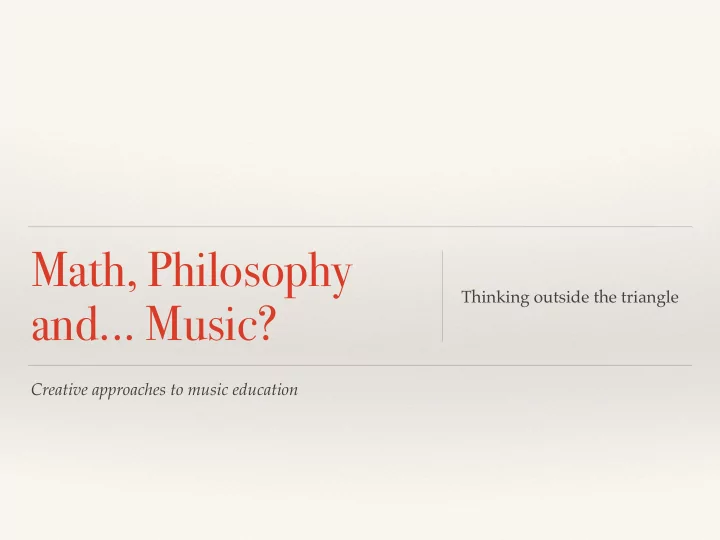

Math, Philosophy Thinking outside the triangle and... Music? Creative approaches to music education
Yaron Herman ❖ Started learning piano at 16 when a knee injury curtailed his basketball career ❖ Studied in Israel under Opher Brayer ❖ Within three years, gained a scholarship to study at Berklee ❖ Released several albums ❖ Rated as one of the top jazz pianists in Europe
Opher Brayer ❖ Describes himself as a teacher foremost - from business management to music ❖ Develops methodologies - has worked with Microsoft and Disney ❖ Discovered Schillinger and the mathematical approach as an alternative methodology ❖ Believes talent can be learned - that you are not born with it ❖ Developed a system called "Real Time Composition"
Joseph Schillinger ❖ Born in the Ukraine, 1895. Moved to New York in the 1930s ❖ Musical advisor to composers such as George Gershwin, Glenn Miller, John Cage, Earl Brown ❖ Wrote the Schillinger System of Musical Composition and founded more than 40 schools ❖ Berklee College of Music was originally Schillinger House ❖ The heart of the system is the concept of permutations - notes, rhythms, phrases etc
The Schillinger System ❖ Permutations of notes: For example, take three notes - how many variations are possible? ❖ Can vary the notes, placement, rhythm etc. ❖ Music more than just permutations - emotion. I must give content, commitment and dynamics to the choices ❖ "Real Time Composition" approach gives form to an idea e.g. AABA ❖ Gives rise to possibilities and exploration, not having to rely on "inspiration" or "talent" ❖ Traditional models of music theory and practice are readily available. The challenge as a music educator is to get students excited about exploration and discovery. ❖ Most importantly, to connect emotionally with the music.
“Opher Brayer is a great motivator and mentor. In regards to psychological elements – he knew exactly where you were in terms of your personality and knew exactly where to push the right buttons to make you overcome your fear; overcome whatever was stopping you from becoming who you could become – psychologically and creatively. ...which is not something we usually deal with in music school, we're like: “there's the knowledge, there's the scale, this is what you can do with it. You can superimpose that on this chord, this chord and this chord”. But no- one goes like, “And who are you?” " –Yaron Herman
G. I. Gurdjieff ❖ Georges Ivanovitch Gurdjieff (1872-1949) Influential spiritual philosopher whose concepts for self transformation focused on developing body, mind and emotions together - "The Work" ❖ The Law of Three: First: the active or initiating force Second: the passive or resisting force Third: the neutralising or connecting force ❖ Non-judgemental self-observation
Pedagogy ❖ "Teaching methods will need to change if educational institutions expect to keep charging thousands for learning that is available free on the internet" - Salman Kahn (NZ Herald, June 2014) ❖ "In my mind, the universities that will thrive are the ones that can articulate what is special about what happens when human beings get together" - Salman Khan (NZ Herald, June 2014) ❖ "The problem isn't about knowledge - the knowledge is out there. The problem is about the 'being'" - Yaron Herman ❖ Balance of intellect and emotion ❖ Encouraging exploration and discovery NOT giving all the answers ❖ Focusing on the individual...
Recommend
More recommend